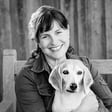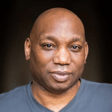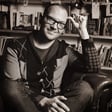
Episode 485: Tensions and Textures with Poet Patrycja Humienik
"God, I feel like I'm still enduring that, like it's this sort of ongoing thing where I'm not sure I ever if I'll ever get to a place where I feel like my work and ambitions for the work and daydreams about writing and art-making ever meet my taste," says Patrycja Humienik.
For Ep. 485 we've got Patrycja Humienik. She’s a poet and her debut collection is We Contain Landscapes and it is published by Tin House. Patrycja is the daughter of Polish immigrants and is a writer, editor, and teaching artist. You can follow her on the gram @jej_sen.
So Patrycja and I had nice little jam sesh about:
- Trusting the path
- The Magic of Revision
- Weekly Writing Rituals with her Work Wife
- Tension and Textures
- And writing without the pressure of publication
Some really rich stuff. Her work has appeared in the New Yorker, that rag, Gulf Coast, Poetry Society of America and many others. She works between borders: of disciplines, language, body, art activism, conflict/transformation. She’s a true artist, man. You can learn more about her at www.patrycjasara.com.
Newsletter: Rage Against the Algorithm
Show notes: brendanomeara.com



















